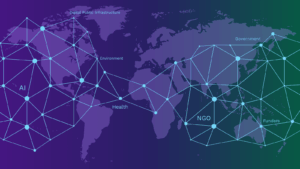The United Nations Conference on Trade and Development (UNCTAD) eWeek 2023, held from December 4 to 8 in Geneva, Switzerland, brought together global leaders, experts, and youth advocates to explore the theme “Shaping the Future of the Digital Economy.” This blog shares insights gathered from the session hosted by the Datasphere Initiative and the Internet Society’s Youth Standing Group on December 7, 2023, titled “The Power of Youth Voices to Reshape the Data Economy.”
The session aimed to address a crucial concern: the lack of youth representation in policy discussions. Despite being the most digitally connected generation in history, young voices are often marginalized in the decision-making processes that shape their roles in the data economy. The imperative to include youth in these types of discussions is highlighted by the belief that a truly equitable data future requires their active participation.
Nicholas Field, Lead Operations & Administration at the Datasphere Initiative, served as moderator of the session and drew attention to the lack of youth representation in crucial areas like data governance and policymaking processes. He highlighted the work of the Datasphere Initiative on responsible data use, amplifying voices, and experimenting with data-sharing solutions.
“The power of Youth must be harnessed in order to ensure we build an equitable data economy” shared Nicholas Field.
Sylvia Poll, Head of the Digital Society Division in the Telecommunication Development Bureau at the International Telecommunication Union (ITU), shared insights into the organization’s commitment to achieving universal, meaningful connectivity. Acknowledging the digital divide that leaves 2.6 billion people without internet access, the ITU focuses on youth inclusion in decision-making processes and shaping digital policies.
ITU initiatives like Generation Connect actively engage global youth, recognizing their role in driving innovation and addressing digital challenges. Dunola Oladapo, member of Generation Connect, and Digital Inclusion (Youth) Programme Officer at ITU, addressed challenges and opportunities in youth engagement, noting the adverse impact of COVID-19 on digital inequalities. Despite challenges, the aim is to achieve equal representation, reduce inequalities, and ensure a more inclusive future for youth.
“As digital natives, and the most connected generation ever, youth today are best positioned to leverage ICTs for the advancement of the SDGs. Youth bring unique perspectives and the fresh energy to push for bold and forward-thinking policies that will foster the enabling environment for all to thrive and prosper in the digital ecosystem. Through Generation Connect, the flagship initiative of the ITU Youth Strategy, the ITU directly engages global youth and encourages their participation as equal partners alongside the leaders of today’s digital change, empowering young people with the skills and opportunities to advance their vision of a connected future” stated Dunola Oladapo.
Céliane Pochon, Junior Policy Advisor at the Swiss Federal Office of Communications (OFCOM) discussed Switzerland’s proactive stance on digital self-determination but raised concerns about limited youth input in tech development. Céliane stressed the need for youth inclusion at all levels of policymaking. She mentioned that partnerships with youth organizations, education, and training programs on data governance are recommended strategies to enhance youth involvement.
“Partnering with youth organizations is also a very effective way of including their voices. For example, the national, regional, and global Internet Governance Fora are making efforts to include Youth in their work. Including youth right now in discussions and developments is ensuring the future generation has access to the knowledge and the tools to continue innovating” noted Céliane Pochon.
Victoria Tianyi Wang, Associate Programme Management Officer, E-Commerce and Digital Economy Branch, Division on Technology and Logistics at UNCTAD emphasized the youth’s instrumental role as the driving force in shaping the digital future. The youth consultation at the UNCTAD eWeek 2023, prioritizing inclusivity, aims to contribute to 2030 SDG Summit and the UN Summit of the Future. She recognized youth as natural contributor and stakeholder in the digital economy, recommendations included strengthening international cooperation in building balanced and effective data governance frameworks, and a holistic and whole-of-government approach in designing inclusive digital policies for a sustainable future for all.
“Youth is uniquely positioned to harness the power of technology and innovation for inclusive and sustainable development gains. Your fresh perspectives, innate tech-savviness, and adaptability are the keys to unlocking new opportunities and solving complex challenges in shaping the future of the digital economy” said Victoria Tianyi Wang.
João Moreno Falcão, Vice-chair of the Internet Society’s Youth Standing Group explored the youth’s role in digital policymaking, highlighting their unique perspectives. João stressed the importance of youth inclusion in policymaking and the significance of continuity and inclusivity in digital initiatives.
“Improving youth participation in digital policy making is essential to mold a future where innovation, equity, and empowerment converge. The digital landscape must reflect the dreams and aspirations of every generation” expressed João Moreno Falcão.
Andrea Palomino, Digital Communications Associate at the Datasphere Initiative, focused on meaningful youth engagement in decision-making processes. She emphasized the important role of youth in shaping the data economy and introduced the Datasphere Initiative’s #Youth4OurDataFuture project, which seeks to enhance the participation and involvement of youth in data governance policy processes and bridge gaps between them and decision-makers.
“We are the most connected generation ever. We have lots of new ideas, but we also have concerns because sometimes our voices get overshadowed by decisions made by others. All of us should be involved in these types of decisions and discussions that will shape our future” said Andrea Palomino.
In conclusion, the speakers highlighted how important it is for young people to have a say in crucial decisions, but at the same time, the need to recognize challenges such as digital inequalities and the limited involvement of youth in tech policy development. Empowering youth voices will serve as a catalyst to responsibly unlock the value for all.
- Read more about UNCTAD eWeek 2023
- Check the AI session’s report
- Read more about the Youth4OurDataFuture project




